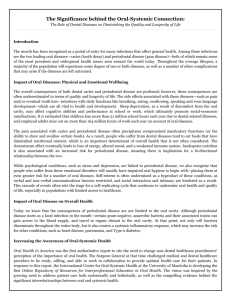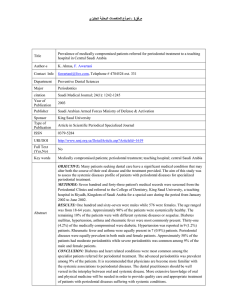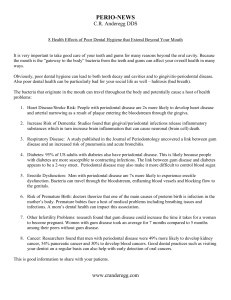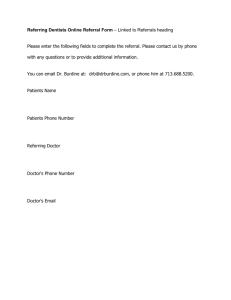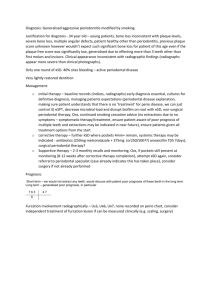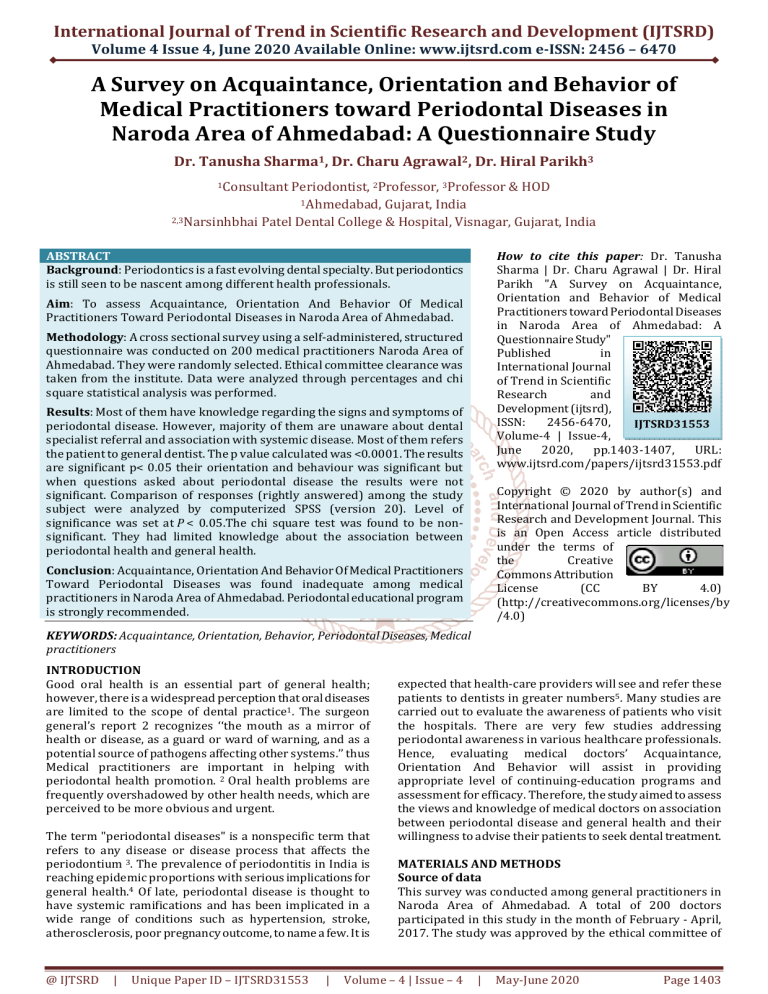
International Journal of Trend in Scientific Research and Development (IJTSRD)
Volume 4 Issue 4, June 2020 Available Online: www.ijtsrd.com e-ISSN: 2456 – 6470
A Survey on Acquaintance, Orientation and Behavior of
Medical Practitioners toward Periodontal Diseases in
Naroda Area of Ahmedabad: A Questionnaire Study
Dr. Tanusha Sharma1, Dr. Charu Agrawal2, Dr. Hiral Parikh3
1Consultant
Periodontist, 2Professor, 3Professor & HOD
1Ahmedabad, Gujarat, India
2,3Narsinhbhai Patel Dental College & Hospital, Visnagar, Gujarat, India
How to cite this paper: Dr. Tanusha
Sharma | Dr. Charu Agrawal | Dr. Hiral
Parikh "A Survey on Acquaintance,
Orientation and Behavior of Medical
Practitioners toward Periodontal Diseases
in Naroda Area of Ahmedabad: A
Questionnaire Study"
Published
in
International Journal
of Trend in Scientific
Research
and
Development (ijtsrd),
ISSN:
2456-6470,
IJTSRD31553
Volume-4 | Issue-4,
June
2020,
pp.1403-1407,
URL:
www.ijtsrd.com/papers/ijtsrd31553.pdf
ABSTRACT
Background: Periodontics is a fast evolving dental specialty. But periodontics
is still seen to be nascent among different health professionals.
Aim: To assess Acquaintance, Orientation And Behavior Of Medical
Practitioners Toward Periodontal Diseases in Naroda Area of Ahmedabad.
Methodology: A cross sectional survey using a self-administered, structured
questionnaire was conducted on 200 medical practitioners Naroda Area of
Ahmedabad. They were randomly selected. Ethical committee clearance was
taken from the institute. Data were analyzed through percentages and chi
square statistical analysis was performed.
Results: Most of them have knowledge regarding the signs and symptoms of
periodontal disease. However, majority of them are unaware about dental
specialist referral and association with systemic disease. Most of them refers
the patient to general dentist. The p value calculated was <0.0001. The results
are significant p< 0.05 their orientation and behaviour was significant but
when questions asked about periodontal disease the results were not
significant. Comparison of responses (rightly answered) among the study
subject were analyzed by computerized SPSS (version 20). Level of
significance was set at P < 0.05.The chi square test was found to be nonsignificant. They had limited knowledge about the association between
periodontal health and general health.
Copyright © 2020 by author(s) and
International Journal of Trend in Scientific
Research and Development Journal. This
is an Open Access article distributed
under the terms of
the
Creative
Commons Attribution
License
(CC
BY
4.0)
(http://creativecommons.org/licenses/by
/4.0)
Conclusion: Acquaintance, Orientation And Behavior Of Medical Practitioners
Toward Periodontal Diseases was found inadequate among medical
practitioners in Naroda Area of Ahmedabad. Periodontal educational program
is strongly recommended.
KEYWORDS: Acquaintance, Orientation, Behavior, Periodontal Diseases, Medical
practitioners
INTRODUCTION
Good oral health is an essential part of general health;
however, there is a widespread perception that oral diseases
are limited to the scope of dental practice1. The surgeon
general’s report 2 recognizes ‘‘the mouth as a mirror of
health or disease, as a guard or ward of warning, and as a
potential source of pathogens affecting other systems.’’ thus
Medical practitioners are important in helping with
periodontal health promotion. 2 Oral health problems are
frequently overshadowed by other health needs, which are
perceived to be more obvious and urgent.
The term "periodontal diseases" is a nonspecific term that
refers to any disease or disease process that affects the
periodontium 3. The prevalence of periodontitis in India is
reaching epidemic proportions with serious implications for
general health.4 Of late, periodontal disease is thought to
have systemic ramifications and has been implicated in a
wide range of conditions such as hypertension, stroke,
atherosclerosis, poor pregnancy outcome, to name a few. It is
@ IJTSRD
|
Unique Paper ID – IJTSRD31553
|
expected that health-care providers will see and refer these
patients to dentists in greater numbers5. Many studies are
carried out to evaluate the awareness of patients who visit
the hospitals. There are very few studies addressing
periodontal awareness in various healthcare professionals.
Hence, evaluating medical doctors’ Acquaintance,
Orientation And Behavior will assist in providing
appropriate level of continuing-education programs and
assessment for efficacy. Therefore, the study aimed to assess
the views and knowledge of medical doctors on association
between periodontal disease and general health and their
willingness to advise their patients to seek dental treatment.
MATERIALS AND METHODS
Source of data
This survey was conducted among general practitioners in
Naroda Area of Ahmedabad. A total of 200 doctors
participated in this study in the month of February - April,
2017. The study was approved by the ethical committee of
Volume – 4 | Issue – 4
|
May-June 2020
Page 1403
International Journal of Trend in Scientific Research and Development (IJTSRD) @ www.ijtsrd.com eISSN: 2456-6470
Narsinhbhai Patel Dental College and Hospital, Visnagar,
Gujarat, India
Method of collection of data
A cross-sectional survey of 200 medical practitioners was
carried out in Naroda Area of Ahmedabad, using a selfadministered, structured questionnaire distributed to
medical doctors at hospitals and private clinic following an
explanation of its purpose and objectives. A simple random
sampling was done.
The first part of the questionnaire recorded information
about general demographics like doctor’s age, sex,
educational qualification, type of service, location of practice
and years in practice. Both male and female medical
practitioners from age group of < 25,26-35,36-45,46-60,>60
years were included. All MBBS, Diploma, MD/DNB, DM
participated in the study voluntarily. The respondents were
divided into two groups based on the type of service
followed – those practicing in public service, those having
only private practice. The second part contained questions
regarding the referral to dentist, the behaviour of medical
practitioners was obtained by providing this set. They were
asked to tick the most appropriate answer according to their
knowledge from the given list of answers. Third part of the
questionnaire carried seven questions and inquired about
general practitioners orientation towards periodontal
disease, including the their primary cause, earliest
symptom/sign,. The knowledge of the bidirectional
relationships between periodontal disease and different
systemic conditions such as Myocardial Infarction and
haematological disorders. For this set of questions, the
participants were given the choice of “True” or “False”. Filled
questionnaires were collected on the same day.
Inclusion Criteria:
The medical practitioners should have registered in the
Medical Council of India
They should be practicing in private clinics or hospital in
Method of collection of data
A cross-sectional survey of 200 medical practitioners was
carried out in Naroda Area of Ahmedabad, using a selfadministered, structured questionnaire distributed to
medical doctors at hospitals and private clinic following an
explanation of its purpose and objectives. Participation was
anonymous to minimize the biasing of data. A simple random
sampling was done.
The first part of the questionnaire recorded information
about general demographics like doctor’s age, sex,
educational qualification, type of service, location of practice
and years in practice. Both male and female medical
practitioners from age group of < 25,26-35,36-45,46-60,>60
years were included. All MBBS, Diploma, MD/DNB, DM
participated in the study voluntarily. The respondents were
divided into two groups based on the type of service
followed – those practicing in public service, those having
only private practice. The second part contained questions
regarding the referral to dentist, the behaviour of medical
practitioners was obtained by providing this set. They were
asked to tick the most appropriate answer according to their
knowledge from the given list of answers. Third part of the
questionnaire carried seven questions and inquired about
general practitioners orientation towards periodontal
@ IJTSRD
|
Unique Paper ID – IJTSRD31553
|
disease, including the their primary cause, earliest
symptom/sign,. The knowledge of the bidirectional
relationships between periodontal disease and different
systemic conditions such as Myocardial Infarction and
haematological disorders. For this set of questions, the
participants were given the choice of “True” or “False”. Filled
questionnaires were collected on the same day.
Inclusion Criteria:
The medical practitioners should have registered in the
Medical Council of India
They should be practicing in private clinics or hospital in
Naroda Area of Ahmedabad
Exclusion Criteria:
General Dentists and Periodontists are excluded from the
study
Statistical analysis
Percentage for the survey was calculated to analyse the
results. Chi-square statistical analysis was done to obtain the
result.
RESULTS
A total of 200 Medical Practitioners took part in the survey.
Response rate was 100%. Table 1 represents the
Sociodemographic personal information. Among this 116
(58%) were males and 84 (42%) were females. The study
included 36(18%) MBBS, 42 (21%) diploma, 105( 52.5%)
MD/DNB and 17(8.5) DM. The mean age was between 46-60
accounting for 112(56%) medical practitioners and 96(
48%) have been practicing for more than 10 years. Out of
200, 132(66%) works in private sector and 68(34%) works
in public sector.
Table 2 demonstrates referral to dentist, among which 105
(51%) referred to general dentist. Half of the respondents
donot refer the patients to specialist 12 (6%) and never
asked their patients about dental treatment in next visit 30
(15%).
Table 3 represents chi square results for orientation and
behaviour of medical practitioners for dentist. Chi square
obtained was 70.3304. P value was <0.00001. The result was
significant at p<0.05.
Table 4 demonstrates questions used in the survey. It shows
the true/false knowledge items with the correct answer and
the percentage of subjects who answered each question
correctly.
Table 5 shows the distribution of correct responses given by
participants based on qualification. MBBS have the least
knowledge when compared to Diploma, MD/DNB and DM
about the potential effects of periodontal diseases on
systemic health. It shows the reported knowledge about
periodontal diseases based on a questionnaire carrying
true/false options, percentage of questions answered
correctly and wrongly. Chi square statistics was calculated to
be 6.8364. The P value was 0.0773. Result were not
significant at p <0.05
DISCUSSION:
This study was mainly aimed at medical practitioners as they
are the primary channel for reaching the people and
Volume – 4 | Issue – 4
|
May-June 2020
Page 1404
International Journal of Trend in Scientific Research and Development (IJTSRD) @ www.ijtsrd.com eISSN: 2456-6470
imparting information about health in such a way that the
recipient is motivated to use that information for the
protection of his own, his family’s or his community’s health.
The evidence based decision process has led to the inclusion
of periodontal disease as one of disease for screening by any
general practitioner Medical doctors may have an
advantageous position compared to the dentists to provide
early patient counselling about oral health as children and
adults attend advisable offices more often than to the dental
offices and are hence more likely to be affiliated to medical
than to the dental insurance6. Moreover, they are more likely
to work in rural and underserved areas than dentists, which
represent a remarkable opportunity for medical
practitioners to work as active players in oral health
promotion.
Medical professionals are required to have a basic
periodontal knowledge as they are the first person to
encounter oral problems in patients while practicing such as
swelling in the oral cavity, bleeding of the gums, if they
examine the oral cavity regularly these conditions can be
very well identified in the initial stages. Early diagnosis of
gingivitis and periodontitis by medical doctors, along with
patient referral to periodontist, will surely improve the oral
health and general health status of the population1. Till date,
there are lot of studies demonstrating periodontitis as a risk
factor for many systemic conditions. Although this
information is very easily available in the medical literature,
there is little information available regarding the knowledge
of medical doctors with regard to periodontitis. Despite the
evidence that there is link between periodontitis and
systemic diseases, most medical doctors are unaware of the
potential benefits of maintaining a good oral health. The
present study reveals Acquaintance, Orientation, Behavior
towards periodontal diseases, the knowledge about the
periodontal diseases it’s causes and association with
systemic conditions was not significant. The drawback of the
present study was it contained close ended questions, so the
assessment of knowledge may be affected. The results
presented indicate the opinions of small sample of medical
practitioners in Naroda Area of Ahmedabad. More larger and
prospective investigations should be carried out.
CONCLUSION
Through the findings in this study, it can be concluded that
general medical practitioners have inadequate knowledge
regarding periodontal diseases. Hence, oral health related
training should be conducted. Increasing the knowledge of
general physicians about the link of oral health and its
bidirectional effect with systemic health will undoubtedly
improve their attitude and behavior toward oral diseases. It
appears likely that this new knowledge that is being gained
in the discipline of periodontal medicine will serve as an
impetus to further coalesce medicine and dentistry.
REFERENCES:
[1] Deepthi Athuluru, Venkatarao Epari, Sreenivas
Nagarakanti. Knowledge, attitude, and practice of
medical doctors towards periodontal disease. Journal
of Indian Society of Periodontology, Vol. 17, No. 1,
January-February, 2013, pp. 137-139
[2] Mundhe Priti G et al. Periodontal Diseases & Treatment
From Perspective Of Medical Professionals: A Survey
Study. Int J Med Res Health Sci. 2015;4(1):193-196
[3] The American Academy of Periodontology. Glossary of
Periodontal Terms. Chicago: The American Academy of
Periodontology; 1992:37.
[4] Dilip Gude, Rekha Rani Koduganti, Surya J Prasanna,
Lakshmi Radhika Pothini. Mouth: A portal to the body
Dental Research Journal. November 2012, Vol 9, Issue 6
[5] Swati Pralhad, Betsy Thomas. Periodontal awareness in
different healthcare professionals: A questionnaire
survey Journal of Education and Ethics in Dentistry
July-December 2011, Vol. 1, Issue 2
[6] Research and Reviews: Journal of Dental Sciences
Periodontal Medicine: Assessment of Awareness
Among Medical Professionals Dr. Megha Varghese, Dr.
Shashikanth Hegde, Dr. Rajesh K.S.2, and Dr. Arun
Kumar2 RRJDS, Volume 3, Issue 1, May 2015
Table 1: Sociodemographic personal characteristic variables (n=200 )
Variables Number Percentage%
<25
5
2.5
26−35
22
11
1 Age (years)
36-45
42
21
46-60
112
56
>60
19
9.5
Male
116
58
2 Gender
Female
84
42
MBBS
36
18
Diploma
42
21
3 Highest qualification
MD/DNB
105
52.5
DM
17
8.5
Public
68
34
4 Type of service
Private
132
66
Urban
52
26
5 Location of practice
Rural
148
74
0-2
12
6
2-5
33
16.5
6 Years in practice
5-10
59
29.5
>10
96
48
@ IJTSRD
|
Unique Paper ID – IJTSRD31553
|
Volume – 4 | Issue – 4
|
May-June 2020
Page 1405
International Journal of Trend in Scientific Research and Development (IJTSRD) @ www.ijtsrd.com eISSN: 2456-6470
MBBS – Bachelor of Medicine/Bachelor of Surgery; MD – Doctor of
Medicine; DM – Doctorate in Medicine; DNB – Diplomate in National Board
1
2
3
4
5
Table 2: Referral to dentist ( n=200)
Number
Yes
48
No
8
General dentist
102
Specialist
12
Enquiring about dental treatment in next visit
30
Percentage
24
4
51
6
15
Table 3 Orientation and behaviour of medical practitioners for dentist (cell total) [chi square statistic for each
cell]
MBBS
Diploma
MD/DNB
DM
1 Yes
9 (8.64) [ 0.01]
13(10.08)[0.85] 16(25.20)[3.36] 10(4.08)[8.59] 48
2 No
5 (1.44) [8.80]
2(1.68)[0.06]
0(4.20)[4.20]
1(0.68)[0.15]
8
3 General dentist
11(18.36)[2.95] 19(21.42)[0.27] 66(53.55)[2.89] 6(8.67)[0.82]
102
4 Specialist
9(2.16)[21.66]
3(2.52)[0.09]
0(6.30)[6.30]
0(1.02)[1.02]
12
Enquiring about dental
5
2(5.40)[2.14]
5(6.30)[0.27]
23(15.95)[3.34] 0(2.55)[2.55]
30
treatment in next visit
36
42
105
17
200 (total)
Chi square statistic is 70.3304.
P value is <0.00001
The result is significant at p<0.05
Table 4: True/false knowledge items with correct answers and percentages of subjects who answered correctly
(n = 200)
Correct
Answering
Questions
answer
correctly (%)
Bleeding gums, exposed roots, loose teeth are signs and symptoms of periodontal
1
True
66
disease
2 Majority of Indian population suffer from periodontal disease
True
54
Certain systemic condition clearly may affect the initiation and progression of
3 gingivitis and
True
30
periodontitis
4 Periodontal disease does not have any potential effect on any organ systems
False
58
5 There is an association between poor dental health and myocardial infarction
True
43
Hematological disorders like production and function of leukocytes does not have
6
False
70
any effect on the periodontium
There is a two way relationship associated with certain
7
True
65
Systemic disease and periodontal disease
Table 4: Comparison of responses among the study subjects (cell total) [chi square statistic for each cell]
Answered correctly Answered wrongly
MBBS
20 (25.38) [1.14]
16 (10.62) [2.73]
36
Diploma
31 (29.61) [0.07]
11 (12.39) [0.16]
42
MD/DNB
80 (29.61) [0.48]
25 (30.98) [1.15]
105
DM
10 (11.98) [0.33]
7 (5.01) [0.79]
17
141
59
200
Chi square statistics is 6.8364
P value is 0.0773
Result is not significant at p <0.05
Questionnaire
Date:
1. Name:
2.
3.
Age (years)
☐ <25
☐26−35
Gender
☐ Male
@ IJTSRD
|
☐36-45
☐ 46-60
☐ >60
☐ Female
Unique Paper ID – IJTSRD31553
|
Volume – 4 | Issue – 4
|
May-June 2020
Page 1406
International Journal of Trend in Scientific Research and Development (IJTSRD) @ www.ijtsrd.com eISSN: 2456-6470
4.
5.
Highest Qualification
☐ MBBS ☐ Diploma
☐ MD/DNB
Type of service.
☐ Public ☐ Private
☐Teaching institute
6.
Location of practice
☐ Urban ☐ Rural
7.
Years in practice
☐ 0-2
☐ 2-5
☐ 5-10
☐ DM
☐ >10
8. Referral to dentist (Tick any of following)
Yes
No
General dentist
Specialist
Enquiring about dental treatment in next visit
9. True/false knowledge items
A. Bleeding gums, exposed roots, loose teeth are signs and symptoms of periodontal disease
☐ True
☐ False
B. Majority of Indian population suffer from periodontal disease
☐ True
☐ False
C. Certain systemic condition clearly may affect the initiation and progression of gingivitis and periodontitis
☐ True
☐ False
D. Periodontal disease does not have any potential effect on any organ systems
☐ True
☐ False
E. There is an association between poor dental health and myocardial infarction
☐ True
☐ False
F. Hematological disorders like production and function of leukocytes does not have any effect on the periodontium
☐ True
☐ False
G. There is a two way relationship associated with Systemic disease and periodontal disease
☐ True
☐ False
Signature
@ IJTSRD
|
Unique Paper ID – IJTSRD31553
|
Volume – 4 | Issue – 4
|
May-June 2020
Page 1407

